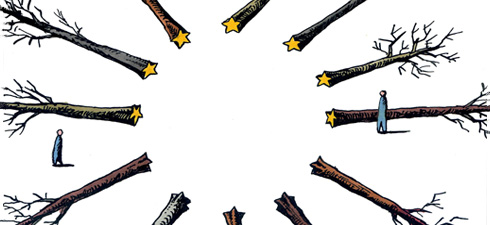In recent days Brussels has been ever more loudly talking about Polish history, though not the end of communism or its successful transition to a market based economy. It is talking of the “golden liberty” of the Polish Lithuanian Commonwealth that collapsed in 1795. “Don’t forget the Polish liberum veto!" [Many historians hold that a major cause of the Commonwealth's downfall was the principle of liberum veto]. "Making the nation’s fate dependent on a single vote of protest led to the Republic’s collapse,” warned Guy Verhofstadt, MEP and former prime minister of Belgium.
Shifting from delight with the EU principle that “everyone is equal”, reflected in the unanamity requirement in many key votes, to drawing comparisions with the perversions of the Polish aristocracy’s veto system is primarily a result of huge problems with getting all the 17 eurozone member states to endorse the European Financial Stability Facility (EFSF), on which the fate of Greece and troubled European banks depend today.
The ratification process encountered obstacles in the Netherlands and Finland, among other countries, but it was the Slovak prime minister, Iveta Radičová, who ultimately “fell in battle” last Tuesday during the ratification vote in the Slovak parliament.
Sow the wind, reap the whirlwind, one could say, because Ms Radičová had herself been drumming up anti-European sentiment for over a year, excelling in chastising Brussels over its allegedly excessive generosity towards Greece. She would explain in Brussels that the Greeks had only themselves to blame and should tighten their belts further instead of reaching out for money from the community.
Barroso losing stature
Although Slovakia will receive over 8 billion euros from the EU budget in 2007-2013 (that’s more than Bratislava’s loan guarantee for the EFSF), Ms Radičová liked the myth about the ant-like laboriousness of the Slovaks, who own nothing that they haven’t earned for themselves.
Bratislava’s example has fuelled debate in Brussels over whether to abandon the unanimity principle in EFSF votes and whether to tie member states’ voting power (on economic issues) to their financial contribution to the euro rescue effort.
Until now this has been done informally – the Sarkozy/Merkel summits outline the key economic reform proposals, which are then endorsed by the rest of the eurozone. When the Germans and the French are unable to reach consensus, lamentations can be heard about the lack of real leadership in Europe; when they near agreement, protests against dictat mount.
Even the Italian foreign minister, Franco Frattini, joined the critics when he complained following the recent Merkel-Sarkozy meeting that the “rest of Europe doesn’t know what they talked about and has no idea what it’s all about.”
Mitigating differences in member states’ weight on the EU forum should be the Commission’s job, but José Manuel Barroso has been rapidly losing stature to European Council president, Herman Van Rompuy. The latter is an undisputed master of behind-the-scenes diplomacy, cruising between the key European capitals and helping to hammer out deals without the involvement of EU procedures or the Commission.
Galloping crisis
Van Rompuy will soon become the president of regular eurozone summits (having been anointed by Berlin and Paris back in August) and hierarchical superior to Jean-Claude Juncker, head of the Eurogroup (the eurozone finance ministers). Paris and Berlin want the Eurogroup to have its own group of permanent advisers and a secretariat.
“The Commission is and should remain the EU’s economic government,” Mr Barroso stressed recently. He is afraid that the new institutions affiliated with the Eurogroup will start stealing the Commission’s prerogatives and shift key decision-making processes beyond institutions provided for by EU treaties.
Paris is happy, however, because it will have more say within a smaller group of eurozone countries – without Britain and many of the Central European countries, which are closer to Berlin on economic matters today.
The eurozone reform to be officially outlined in the days to come will surely enhance the single currency’s ability to weather financial crises, but will deepen the European Union’s division into an inner core (the eurozone) and the rest, including Poland. But the galloping crisis means that one can hardly even protest against this.
Sovereignty
Some Europeans are more equal than others
“Sovereignty is a cool thing, but the smallest shareholder of the entire community cannot block the EU’s actions. Unless it’s a big shareholder: Britain, France or Germany. Then the veto is OK." So opens an ironic commentary from aDziennik Gazeta Prawna columnist after European Commission president José Manuel Barroso denounced as “unacceptable” the Slovak Parliament's initial rejection of the bailout plan for heavily indebted eurozone countries.
The Polish columnist deplores the fact that while Slovakia has been pilloried, no famous European politician has said anything about the "irresponsibility of the UK when it blocked taxes on financial transactions." Nor did anyone scold the French and Dutch for rejecting the EU constitution in referendums. "The Slovaks have the right to also doubt whether the debt crisis should be resolved by incurring further debt. This is not a question of a madman or a populist [...] Jose Barroso and his ilk should accept that regardless of the circumstances, Slovakia has sovereignty and a vote."
Was this article useful? If so we are delighted!
It is freely available because we believe that the right to free and independent information is essential for democracy. But this right is not guaranteed forever, and independence comes at a cost. We need your support in order to continue publishing independent, multilingual news for all Europeans.
Discover our subscription offers and their exclusive benefits and become a member of our community now!












